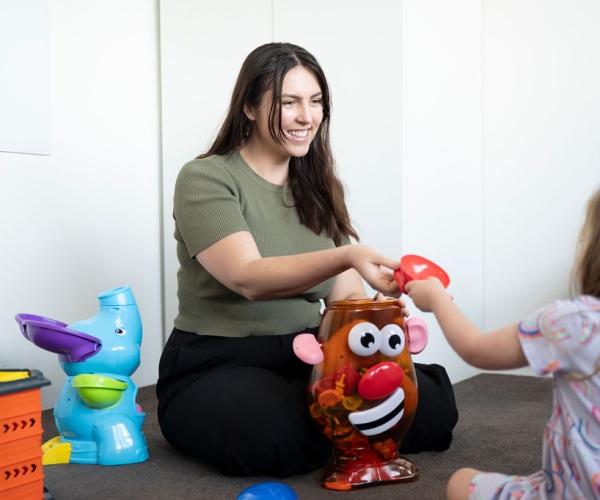Seeking therapy for yourself or your child can feel like a big step, and it’s natural to have questions about what to expect. At Prosper Health Collective, we believe in providing evidence-based care that empowers our clients to achieve their goals. Whether you’re considering Speech Therapy or Occupational Therapy, understanding the process can help you feel more prepared and confident. In this guide, we’ll explain what happens in therapy and the roles of both the therapist and client.
What is Speech Therapy and Occupational Therapy?
Speech therapists work with people of all ages to address a variety of speech, language, social communication or feeding challenges. Speech Therapy focuses on the identification and treatment of communication and mealtime disorders, working with children and families to improve areas such as their speaking and listening skills, language development, social interactions, and even mealtime and swallowing difficulties.
Occupational Therapy, on the other hand, helps individuals develop or regain the skills needed for daily living and independence. This includes fine motor skills, sensory processing, self-care activities (such as dressing and eating), and skills needed for school, work, or social engagement. Occupational Therapists work with people who have physical, developmental, or cognitive challenges to enhance their quality of life.
What Happens in a Therapy Session?
Each therapy session is tailored to the individual’s unique needs and goals, but there are some common elements you can expect:
1. Initial Consultation
Before therapy begins, your therapist will conduct an assessment to understand your child’s strengths, challenges, and goals. This may involve:
- Standardised tests and informal playbased observations
- Discussions about medical and developmental history
- Parent, teacher, or caregiver input (for children)
The aim of the initial consultation is to create a safe and comfortable space for you and your child and gather information to inform and develop a personalised therapy plan that targets the most important areas for improvement.
2. Goal Setting
Once the assessment is complete, the therapist will work with you (or your child and family) to set realistic, achievable goals. These goals may focus on areas such as:
- Speech Therapy – Improving speech sounds or language skills, enhancing social communication abilities.
- Occupational Therapy – Developing fine motor or self-care skills, managing sensory sensitivities, improving attention and executive functioning skills.
3. Active Therapy Sessions
Each session is designed to be engaging and structured to maximise progress. Some typical activities include:
- For Speech Therapy: Play-based learning for children, articulation exercises, language comprehension tasks, social communication practice, and voice training.
- For Occupational Therapy: Play-based learning for children; Handwriting exercises, sensory integration activities, self-care practice, and strategies for improving attention and coordination.
Therapists use evidence-based approaches and hands-on activities tailored to the client’s goals and preferences to make sessions effective and enjoyable.
Child therapy often involves elements of play as an engaging tool to understand a child’s needs and support their growth. See our Play Therapy Blog for further information on the use of play in therapy.
4. Home Practice and Parental Involvement
Therapy doesn’t stop when the session ends. One of the most critical parts of progress is applying what is learned in therapy to everyday life. Therapists provide guidance on home exercises and/or practical strategies for parents, caregivers, and clients to embed skills in real-world settings and your family routines.
A Collaborative Journey
At Prosper Health Collective, our team of experienced professionals deeply care about their clients and collaboratively work with each individual and family to assist them in achieving their goals. Some of the ways your therapist will support you include:
- Assessing strengths and challenges
- Creating a customised therapy plan
- Using effective, evidence-based strategies
- Encouraging and motivating clients
- Adjusting therapy techniques as progress is made
In order to get the most out of your therapy sessions, clients benefit from:
- Actively participating in sessions
- Practicing exercises at home
- Communicating any concerns or challenges
- Collaborating with the therapist to set and achieve goals
For children, parents and caregivers play a crucial role by reinforcing strategies at home, supporting skill development in daily routines, and maintaining open communication with the therapist.
Starting Therapy at Prosper Health Collective?
At Prosper Health Collective, we prioritise a client-centered approach, using the latest research and best practices to help you or your child succeed. Our compassionate team of therapists is dedicated to providing high-quality care in a supportive and welcoming environment. We’re here to guide you every step of the way of your therapy journey.
